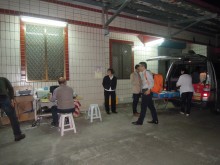Researchers doing fieldwork on a short-term basis beware; it can be immensely challenging to gain an accurate picture of healthcare challenges in marginalized communities. My colleague and I were fortunate enough to accompany our professor, Dr. Joseph Wong to do fieldwork on the healthcare challenges faced by Taiwanese Aboriginal communities. Policymakers are particularly concerned about high rates of alcoholism in these communities, though we found that they did not always agree on its causes. In a couple of brief but intense days of research, we found that policymakers and frontline workers had vastly different interpretations of why alcoholism existed, and as a result, how it should be remedied. While the disconnect was problematic, Aboriginal communities did gain some degree of effective service delivery, because fieldworkers were empowered to implement programming.
Our first few interviews were central – they happened with high-level decision makers for the National Health Insurance (NHI) program in Taipei. As I understand it, these policymakers take a macro view of the healthcare industry, and perhaps may not be overly familiar with specific community based challenges. The Aboriginal community constitutes about 2% of the Taiwanese population – it is small but important, but may be lost in the myriad of other issues central decision makers have to address. When asked about alcoholism in Aboriginal communities, these individuals attributed the trend to cultural factors – they believed daily alcohol consumption was always a part of Aboriginal culture, and so was extremely difficult to address through policy.
Thankfully, front line workers close to Aboriginal communities did not share this viewpoint – later meetings with both frontline workers and policymakers that deal directly with Aboriginal communities brought a more nuanced perspective to the table. Frontline workers attributed the growth in alcoholism to both a lack of economic opportunity and cultural disruption. Regular paid labor was often not available at or near Aboriginal communities. Moreover, access to the financial instruments we take for granted – savings accounts, regulated credit, financial advice – were simply not available near Aboriginal communities. What did exist was a predatory alcohol sales system immediately available to them, usually conveniently located near where people collected their pay cheques for sporadic day labour.
It would be a mistake to attribute alcoholism entirely to economic factors. Taiwanese Aboriginals had for years faced a kind of cultural disruption that has been experienced by colonized groups elsewhere, including Canada. Under Japanese colonialism and Sinicization campaigns, their cultural growth and practices had been disrupted. In Canada, similar activities have also traumatized Aboriginal communities, perhaps with eerily similar impacts. The roots of alcoholism are therefore much deeper and more complex than “cultural practices.”
Policymakers working directly with Taiwanese Aboriginal communities also had a more nuanced view of challenges faced by the communities. One particular policymaker had designed a series of creative interventions educating Aboriginals on the risks of alcoholism. Moreover, he was supported by frontline policymakers and workers who were from Aboriginal communities. We met a nurse who had been given leeway to design programs she felt were suited to her community – and that’s what worked! As should be expected, giving resources to those closest to the community, or part of it, increases social impact exponentially.
As researchers with only a couple of days on the field, I feel lucky we were under the guidance of a Professor. Professor Wong was quickly able to capture the assumptions made by the first few policymakers and ensure that they became a core line of questioning as we visited field sites in Southern Taiwan. Of course, with only two days of field research, we barely scratched the surface of alcoholism-related healthcare challenges – our field research will certainly continue within the next few months. Without challenging the first policymakers’ assumptions (or without having a critical background) it might have been easy to be swayed by their superficial analysis. More critically, if frontline fieldworkers like nurses were not given leeway to create programming specific to the communities they are from and serve, addressing alcoholism in Aboriginal communities would be much more difficult, as it is obvious that high level policymakers are disconnected from the issue.
The same attitudes are held by a lot of high-level Canadian policymakers addressing healthcare (and other) challenges in Aboriginal communities. Decision makers are disconnected from communities impacted by alcoholism (and other healthcare challenges – like poor housing). Assumptions, rather than critical research, form the basis of policy. But unlike Taiwan, in Canada there is no linkage between informed frontline workers and communities. Community leaders or healthcare workers are not financially empowered to develop programming for their communities, given their unique understanding of its situation and values. While an ideal system would empower and inform everyone from the fieldworker to the decision maker about challenges faced by marginalized communities, empowered frontline workers is a critical first step towards healthcare delivery in geographically marginalized communities.
Remi Kanji is a former Asia-Pacific Studies student and co-founder of SIRG (www.sirg-taiwan.org), who will stay on in Taiwan to continue the project, learn Chinese, and work on her own social enterprise – a mobile based platform helping consumers authenticate fake pharmaceuticals.
